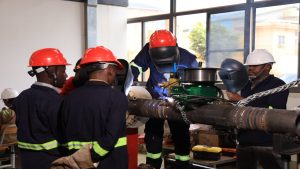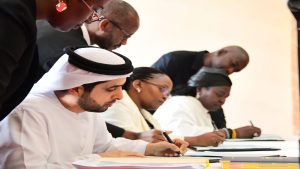Share
Youth from Bunyoro have been cautioned against being utilized to sabotage the region’s continuing oil extraction efforts.
Sam Mugisa, the social affairs coordinator for the Petroleum Authority of Uganda (PAU), issued the warning three days after a group of alleged East African Crude Oil Pipeline Project (EACOP) project-affected persons (PAPs) from Kikuube and Hoima districts demonstrated and called for the project’s immediate termination.
There were numerous human rights violations and environmental degradations during the project’s implementation, according to the group of more than 100 men and women holding placards with messages that read, among other things, “No to land grabs,” “No to eviction,” “No to environmental harm,” “No to EACOP,” “Stop EACOP,” and “Chinese financial institutions, should stop funding EACOP.”
In order to give their complaints enough time to be comprehended and effectively handled, the PAPs urged that the EACOP project be halted right away.
In order to maintain biodiversity for future generations, they also call for the conservation of natural parks and biodiversity, emphasizing that all oil operations in national parks and protected areas must end.
The PAPs further call for an immediate halt to the alleged persecution and detention of grassroots human rights and environmental defenders who are fighting for the rights of impacted communities.
One of the accused PAPs, Barak Bakundane, said that it should be illegal to destroy the environment at this crucial moment, when the country and the Albertine region are entering the oil and gas development period.
Another purported PAP, Innocent Tumwebaze, claimed that despite the government acquiring land for the project, residents were not adequately compensated. He asked the implementers to start by addressing the compensation issue.
He went on to say that the project has harmed the environment by intruding on and destroying water sources, wetlands, and swamps, as well as by removing trees for the pipeline’s construction and without replacing them.
He cautioned that ecosystems are seriously threatened by the possibility of oil spills and other environmental dangers, putting wildlife and communities who depend on the environment for their lives in jeopardy.
Another person impacted by the EACOP Project, Sarah Natukunda, claimed that the compensation was insufficient. According to her, the project’s long-term environmental and social costs frequently surpass any short-term economic gains like infrastructure development and employment creation.
Unfounded allegations
But according to Mugisa, who was in Hoima on behalf of PAU executive director Ernest Rubondo at the Bunyoro-CNOOC Amasaza Cup competition inauguration on December 10, 2024, the youth’s accusations were baseless.
He claimed that the group’s actions were motivated by those who opposed Uganda’s oil and gas expansion.
He urged the authorities of the Bunyoro region to educate the young people about the value of Uganda’s oil and gas industry so that they won’t be left with little money to fight against it, which is predicted to revolutionize the nation’s economy.
“Let me discuss the youth who are used to opposing the oil and gas industry. I suggest that they use their time to participate in activities that benefit them, as we are witnessing the benefits of oil and gas developments through the construction of good roads and the construction of airports.
being built and many other things are on the horizon, so we need to educate the youth to avoid being taken advantage of and duped by small sums of money given to them by certain Western groups that do not want African nations to grow. Since the youth make up a large portion of the population, leaders should engage them before they cause problems,” he said.
In response to activists’ concerns about the project’s effects on the ecosystem, he pointed out that it is being carried out with environmental sustainability in mind.
From the Hoima area in Uganda to the Chongoleani peninsula close to Tanga Port in Tanzania, Uganda’s crude oil will be transported via a 1,443-kilometer crude oil export pipeline.
Under the company name EACOP LTD, the governments of Tanzania and Uganda (represented by the Tanzania Petroleum Development Corporation (TPDC) and Uganda National Oil Company (UNOC), respectively), Total Energies, and China National Offshore Oil Corporation (CNOOC) carry out EACOP projects.
After passing through Hoima, Kikuube, Kakumiro, Kyankwanzi, Mubende, Gomba, Sembabule, Lwengo, Kyotera, and Rakai in Uganda, the pipeline will cross the Tanzanian border between Masaka and Bukoba, go through Kahama, Singida, and Kondoa, and finally arrive in Tanga.









